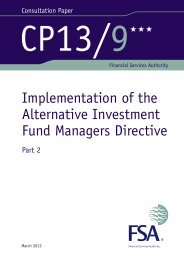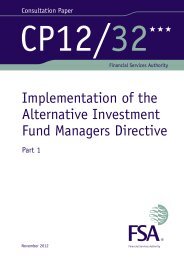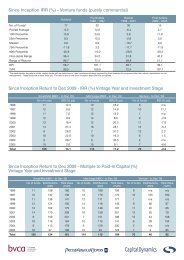A Guide to Private Equity - BVCA admin
A Guide to Private Equity - BVCA admin
A Guide to Private Equity - BVCA admin
Create successful ePaper yourself
Turn your PDF publications into a flip-book with our unique Google optimized e-Paper software.
Enterprise Investment Scheme<br />
The Enterprise Investment Scheme which was set up by the UK government <strong>to</strong> replace the Business<br />
Expansion Scheme (BES) and <strong>to</strong> encourage business angels <strong>to</strong> invest in certain types of smaller<br />
unquoted UK companies. If a company meets the EIS criteria (See http://www.hmrc.gov.uk/eis/), it<br />
may be more attractive <strong>to</strong> business angels, as tax incentives are available on their investments. Under<br />
the Enterprise Investment Scheme, individuals not previously connected with a qualifying unlisted<br />
trading company (including shares traded on the Alternative Investment Market (AIM)) can make<br />
investments of up <strong>to</strong> £500,000 in a single tax year and receive tax relief at 20 % on new subscriptions<br />
for ordinary shares in the company, and relief from CGT on disposal, provided the investment is held<br />
for three years.<br />
Venture Capital Trusts (VCTs)<br />
Venture Capital Trusts (VCTs) which are quoted vehicles <strong>to</strong> encourage investment in smaller unlisted<br />
(unquoted and AIM quoted) UK companies. Inves<strong>to</strong>rs receive 30% income tax relief on VCT investment<br />
on a maximum investment amount of £200,000 in each tax year provided the investment is held for<br />
five years. Shares in VCTs acquired within the annual limit are also exempt from capital gains tax on<br />
disposal at any time.<br />
For further information on the above UK government grants and others available visit the website<br />
of the Business Links at www.businesslink.gov.uk. In addition <strong>to</strong> providing advice on the various<br />
grants available <strong>to</strong> SMEs and growth companies the Business Links provide advice, help and an entry<br />
point <strong>to</strong> the various schemes run by the Department for Business, Innovation and Skills (BIS). New<br />
businesses (particularly those using new technology) can get help with premises and management<br />
from the various Business Incubation Centres in the UK or from one of the UK Science Parks. You<br />
may also be eligible for EU grants if you are in an innovative business sec<strong>to</strong>r or are planning <strong>to</strong> operate<br />
in a deprived area of the UK or a region zoned for regeneration. Apart from Business Links your local<br />
Chamber of Commerce and <strong>to</strong>wn hall should have lists of grants and available property.<br />
Business angels<br />
Business angels are private inves<strong>to</strong>rs who invest directly in private companies in return for an equity<br />
stake and perhaps a seat on the company’s board. Research has shown that business angels generally<br />
invest smaller amounts of private equity in earlier stage companies compared with private equity<br />
firms. They typically invest between £20,000 and £200,000 at the seed, start-up and early stages of<br />
company development, or they may invest more than this as members of syndicates, possibly up <strong>to</strong><br />
£1.5 million. Business angels will usually want a “hands-on” role with the company that they invest in,<br />
maybe as an adviser and/or a non-executive direc<strong>to</strong>r or they may even take on an executive role. Many<br />
companies find business angels through informal contacts, but for others, finding a business angel<br />
may be more difficult, as the details of individual business angels are not always available. The British<br />
Business Angels Association (BBAA) lists its members on its website (www.bbaa.org.uk) so this is a<br />
good place <strong>to</strong> start <strong>to</strong> help you find business angel inves<strong>to</strong>r networks in the UK.<br />
Corporate venturing<br />
Corporate venturing has developed quite rapidly, albeit sporadically, in recent years but still represents<br />
only a small fraction when compared <strong>to</strong> private equity investment activity. Direct corporate venturing<br />
occurs where a corporation takes a direct minority stake in an unquoted company. Indirect corporate<br />
venturing is where a corporation invests in private equity funds managed by an independent private<br />
equity firm. Corporate venturers raise their funds from their parent organisations and/or from external<br />
sources.<br />
An introduction <strong>to</strong> private equity<br />
A <strong>Guide</strong> <strong>to</strong> <strong>Private</strong> <strong>Equity</strong> 11
















